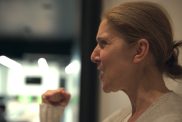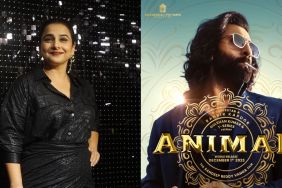Many films from Iran have been imported into the United States over the past few decades, but few of them have really made much of a mark. That’s likely to change with A Separation, the latest from filmmaker Asghar Farhadi, whose previous film About Elly got some recognition at festivals, but not nearly as much as his fifth feature film.
As hinted in its title, A Separation starts simply enough as the story of a middle class couple in Iran going through a divorce. As they figure out whether their daughter will go to America with her mother or stay in Iran with her father, he hires a maid to care for his Alzheimer’s-stricken father. That maid is facing a number of domestic and religious issues that complicate matters, leading to a situation none of them could have foreseen.
Farhadi has delivered an intense drama that has received recognition and accolades everywhere it’s played due to the filmmaker’s ability to tell a compelling story that really pulls you in with its universal familiarity as much as it’s a story that could only take place in Iran, because it shows how the laws there turn seemingly innocuous acts into something with enormous repercussions. And that’s all we’ll say about the plot because part of the joy of the film is discovering all the twists and turns for yourself.
The film has already been sweeping most of the early critics awards and been nominated by many groups as the best foreign language film of the year, and many feel (with good reason) it’s the frontrunner for the category at the Oscars in February as well.
ComingSoon.net spoke with the 39-year-old Farhadi back in September when he was in New York City to present his film at the New York Film Festival, part of a long-run of festivals that started in Berlin, where the film won multiple prizes including the coveted Golden Bear.
ComingSoon.net: This is probably a hard movie to talk about because there are so many twists and turns and things you wouldn’t want to reveal. How long after “About Elly” did you start working on this? Was it pretty much immediately?
Asghar Farhadi: I was thinking about this film while I was making “Elly” but I actually started working a year and two months after the screening of “About Elly,” I started writing this film.
CS: They’re both mysteries in some ways, handled differently. Are you a fan of that sort of genre or the mystery premise? Was there something with “About Elly” you wanted to explore further?
Farhadi: Yes, there is a similarity in styles, but I don’t decide ahead of time that’s the style I’m going to pursue. It’s just the story leads me to creating them in that style. I do feel that all three are somewhat linked, like three links in a chain these three films. The third one is called “Fireworks Wednesday.”
CS: Do you feel like you approached this one differently, either in the writing or the casting? Do you feel this one is very different from those in the way you approached it?
Farhadi: The way of working with actors, that was different. Each project, the way I worked with the actors was somewhat different, but in the approach to the screenplay, they were similar. In “About Elly” it was more about working with the ensemble, with all the actors together, whereas here, it was about working individually with each actor separately. In “About Elly,” I needed them to become a group, to become more cohesive; here, I needed them to be more separate.
CS: That’s what I felt, that “Elly” was a bit more naturalistic and this one felt a bit more written. Did you actually write a full script for the actors?
Farhadi: When I started, the screenplay was complete. Maybe there were a few things that changed once the shooting begins but it’s basically like having a musical composition and working with the orchestra. It’s a complete piece, it’s all done. Once we start, I don’t want to change things around, because if you change something today, in ten days, you suddenly see that it has affected something that you have not foreseen, but in the several months before the actual shooting begins, when the screenplay is completed and work is being done with the actors in rehearsal, there, things might still shift, but once the shooting begins, it is set.

CS: You mentioned you worked with the actors individually, so did you also do table reads with all the actors together?
Farhadi: No, you don’t have this sitting around the table and reading the screenplay where each person reads. He will read the entire screenplay once to everyone, and then they set the screenplay aside and the rehearsals are not using the actual text from the screenplay. It’s rehearsing around it, but the script has been set aside.
CS: And that was different from the other movies you’ve directed? That’s something you did specifically for this movie?
Farhadi: For “About Elly,” the process was the same. It’s just the improvisations that were done were different. For example, in “About Elly,” they would improvise on scenes that were not actually part of the film. Elly and her fiancé never actually meet in the film, they were never seen together, but a lot of improvisation was done to establish their relationship so that when they would talk about one another, there was a real relationship to refer to. With “A Separation,” it was totally a different way. We were totally in the city, going around and interacting. We didn’t work in a workshop or in a studio space. We were exploring throughout the city and with the guy who plays the investigator, we would hang out together, we would go to the place of the investigations. I had him introduced to someone who did that kind of work, and he would just sit there and just watch this guy doing that kind of work to get a sense of what it meant. They worked specifically on details sometimes. For example, from the moment they signed the contract with the actor who played Nader, he wanted for that character to like traditional music and specifically (Mohammed-Rez) Shajarian and part of the contract with him was that he would listen to only Shajarian music throughout this rehearsal process and then the shooting, so that he only had one line where he mentions that kind of music but that one line reflects that he really knew the music and loved the music.
CS: It sounds like your process is a bit like Mike Leigh. Maybe not as extreme, but Mike Leigh does a lot of work developing the characters with the actors in a similar way. There are a few actors you’ve worked with before, so what was your process for finding the other actors?
Farhadi: Most of the main characters I had already worked with, but for the character of Razieh, I had never worked with her before, and when we were doing the casting, I don’t trust myself to see the person live and make the decision, because I can be tricked or fooled, so what I do is have everyone be filmed in their audition and then I was able to see how that person looked on film, because they look different than from reality, and then based on that and from 180 people, it got reduced just down to a few and then I chose from them. More important than the image is the voice, because an actor on a screen, the audience gets used to the visual, but the voice is like music and how it changes with the wording, depending on what they’re saying, is what I’m more interested and I find that the quality of the voice is more important.
CS: How does that affect a movie where most people watching it will be writing the subtitles? We do get used to those voices and the way they talk but we’re still reading their words.
Farhadi: That’s a bit concern for me and when they’re showing my films abroad, all these details and things I’ve put there are being reduced to that little line that goes by so fast. What can people actually catch from having to read that? I always feel that the subtitles are so condensed, and I’m always surprised when people say “I understood your films,” I’m like, “How can you understand it based on that little bit of writing?”
CS: We get used to reading fast because we see a lot of foreign films.
Farhadi: But on the other hand, when I see a film where I need to read the subtitles, I feel that I understand it very well, and maybe I understand it even better than people who understand the language.
CS: That brings me to another question and that’s why there isn’t any music in the movie? I can’t remember if “About Elly” had music in it but was that a very conscious decision not to have any music?
Farhadi: Yeah, in all three of my films, there is very little music. There has been primarily music during the credits and it’s not that I don’t love music, it’s actually that I love music so much that I think I have to use it very sparingly. Often times, music is used to evoke an emotion and it’s become a cliché, so I don’t want to do that, and actually what I do, is that emotional intensity that has developed throughout the film, I allow it to get released by having that music at the end with the credits.

CS: Music is often used as a crutch. When a scene doesn’t work, you can put music on it and make it work, so for a movie like this to work well without it is great. I think one of the reasons the movie is connecting with people is that it’s a fairly simple story but with so many layers. Do you think something like this can happen anywhere besides Iran? Or do you think so much of what happens is due to the laws there and how women are treated?
Farhadi: I think that it’s a story that could happen anywhere in the world with some minor changes or differences, but it’s basically a universal story. Because it’s primarily about relationships between people and that happens everywhere in the world.
CS: As do conflicts between people.
Farhadi: When we say it’s a simple story, it’s because the drama happens from very simple everyday details and actions. It’s not some big event that creates the drama, it’s the little things of everyday life that bring about that drama.
CS: I also liked that the movie almost forces you to see the movie a second time because there’s so much discussion about one specific scene and one discussion about whether or not he knows the maid is pregnant, and as they discuss it, you realize you’ve seen the scene play out, but it didn’t seem of importance when it happened. So it makes you want to see the movie again.
Farhadi: It’s a way of forcing the audience, once the film is finished, to go back in their thoughts and retrace, “oh, when did that detail happen?” and then retrace all of these things and so, even though the film ends, in the mind of the spectator, the film does not end. It continues. For example, when a detail happens that’s going to be echoed later on, that detail is not highlighted because if you highlight it, then it’s like, “Oh, this is going to become significant later,” but if you don’t, then when something echoes it, you think, “Oh, wait a minute,” and you, in your mind, go back. So it makes audience members want to see it more than once.
CS: Which is a good kind of movie. A lot of really terrific films from Iran have played in the States, but as a Westerner, it feels like we’re only getting a very specific view of the country so our impression is that the law doesn’t work there and that women get the worst of it. Do you think that it’s very representative of the country or is that just the part that seems to be a focus of many filmmakers?
Farhadi: There are a lot of different films that come here, I believe. Some seem to portray Iran as somewhere where everything is going badly. Some portray it as somewhere where everything is great. I don’t feel like there is that homogeneity.
CS: I was thinking of films like “Outside” and “Persepolis,” and more recently, “Circumstance,” as well as couple others. Do you still live in Iran yourself?
Farhadi: Yes.
CS: Here in the States, we get the impression that it’s still very traditional, so do you feel it’s changing and that maybe Iran is closer to breaking away from those traditions or is that still very present?
Farhadi: It’s like shedding skin and shedding skin is always a painful process, but yes, the country is changing.
CS: How do you feel about the movie being picked by Iran to represent the country at the Oscars and coming to the States as a representative of your country? Is there a lot of pressure with taking on that role?
Farhadi: I feel that it means a lot to the people of Iran that my film is represented at the Oscars, and it makes me happy to bring them that joy, that I’m representing them and that I’m able to give them that element of pleasure to be the envoy from Iran. It’s a very pleasant thing.
CS: It’s been a long road for the movie, since it was at Berlin in February and in Toronto in September, so when did the movie actually open in Iran?
Farhadi: In March, one month after Berlin.
CS: Since the movie has been done for a while, have you started thinking about what to do next? You’ll be talking about this movie for at least six more months I figure.
Farhadi: I’ve been thinking and I think in a year or so, I’ll be working on the new project but my schedule is insane.
Unfortunately, our last question to Farhadi may be seen as a plot spoiler and we don’t want to do that. Sorry!
A Separation opens in New York and Los Angeles on Friday, December 30.









